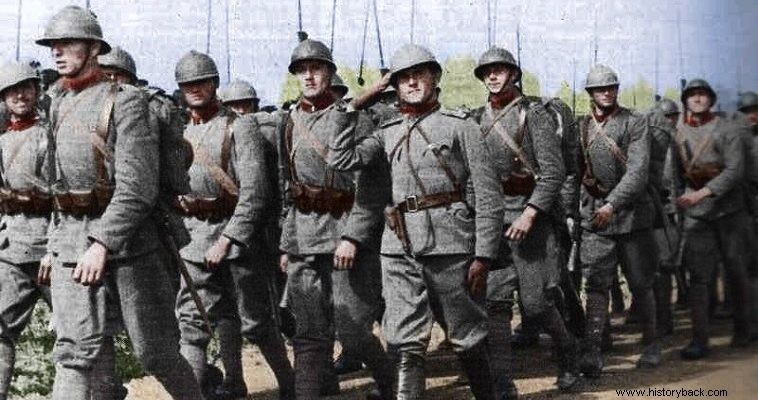
Yugoslavia was not involved in the war until April 1941. Since the end of November 1940, Hitler had attempted to bind this country to the German chariot, in view of the planned attack on Greece. On November 28 Hitler met with Yugoslav foreign minister Markovic , to whom he proposed the accession of Yugoslavia to the Axis, at the same time informing him of his intention to intervene against the Greeks and in favor of the Italians.
German approach, success and reversal
Immediately after the expulsion of the British, he told him, border arrangements would be made and Yugoslavia would have an exit to the Aegean. However, Italian interests in the region also had to be taken into account. This was precisely the reason for Yugoslavia not joining the Axis, the Italian reaction, since Mussolini considered the Balkans to be Italy's exclusive sphere of influence.
On February 14, 1941, Hitler and Ribbentrop met with Yugoslav Prime Minister Cvetkovic and Minister Markovic. However, the two sides did not reach an agreement. On March 4, contacts resumed, this time between Hitler and Viceroy Paul. Again, however, the Yugoslav side objected to Italian involvement in the Balkans and no agreement was reached. On March 18, however, the Yugoslavs finally accepted the German proposals and the country became a member of the Axis. The official accession ceremony took place on March 25 in Vienna.
However, Hitler's joy did not last long, as on the night of April 26-27, 1941, a military coup occurred in Belgrade. Viceroy Pavlos, the warmest devotee of cooperation with the Germans, was overthrown and the government was taken over by Wing Commander Simovics. The new Yugoslav government refused to ratify the Axis accession pact, but nevertheless publicly pledged that it did not intend to pursue an anti-German policy.
But Hitler was not convinced and ordered his staff to plan the attack on Yugoslavia – Plan 25. The Yugoslavs tried to cling to the Russian sphere of influence. On April 3, a Yugoslav delegation arrived in Moscow and soon a non-aggression pact was signed between Yugoslavia and the USSR. However, Stalin preferred to sacrifice Yugoslavia, rather than his friendship with Hitler. Thus the Yugoslav-Soviet agreement remained an empty letter. Three days later the Germans attacked.
Greece
Yugoslavia's attitude was of particular interest to hard-fought Greece. The refusal of the Yugoslavs to clarify their position right from the start created major problems on the Greek side. After the Yugoslav post-colonization, there were contacts between Greeks and Yugoslavs, at the level of senior officers, with the aim of jointly dealing with the impending German threat. In principle, the Greek commander-in-chief Papagos asked the Yugoslavs to attack the left flank of the Italian formation in Albania, which was based on Lake Ahrida, in conjunction with an attack by the Greek forces of the Western Macedonian Army Division (TSDM). Papagos' goal was to throw the Italians into the sea, before the full involvement of the Germans.
Also, in a meeting he had with a Yugoslav colonel of the general staff, he expressed his fears that the Yugoslav defense plan gave no serious chance of success. So he called on the Yugoslavs to organize defensively in the area from Ahrida to the Krusia mountains, covering the Doirani - Monastiri - Florina sector with the bulk of their forces. In this way the Yugoslavs would give up most of their country to the enemy without a fight, but a stable front would be created, supplied from Thessaloniki, which could not be overflanked, nor would it be easy to break.>
The Yugoslavs did not accept this suggestion and deployed their 29 Infantry Divisions (IP) and 3 Cavalry Divisions (MI) linearly along their extensive border (approximately 3,000 km long), from the Italian border to Adriatic coast, the Hungarian border, the Romanian border, the Bulgarian border and the border with Albania, leaving only one MP in the area of Skopje, which could cooperate with the Greek Army.
This defective, linear arrangement was the culmination of the disaster. The volume of their forces not only developed linearly, but also there was no provision for the formation of serious reserve masses. Also, at the start of the German invasion entire units of Croats killed their Serbian officers and surrendered to the Germans. In some cases they even fought alongside the invaders. As for any plans for joint action with the Greeks, even if only the MP that they kept in Skopje, they didn't come to fruition either , as dissolution swept through the Yugoslav Army, in just three days.
This event, of disbanding an army of 32 divisions in three days, was the greatest strategic surprise achieved by the Germans. Papagos did not believe in the Yugoslav victory. But he believed that the Yugoslav Army, or at least a large part of it, would manage to retreat fighting and take positions between Florina and Doiran. He also believed that the Yugoslavs would hold out for an extra few days, giving him the necessary time to modify the Hellenic Army's order of battle, depending on the Germans' main axes of attack. Unfortunately, neither happened. And the only contribution of the Yugoslavs to the struggle of the Greek Army was a half-hour bombardment with mortars, of the Italian positions, on April 8. This was their only offer in the Greek race.
